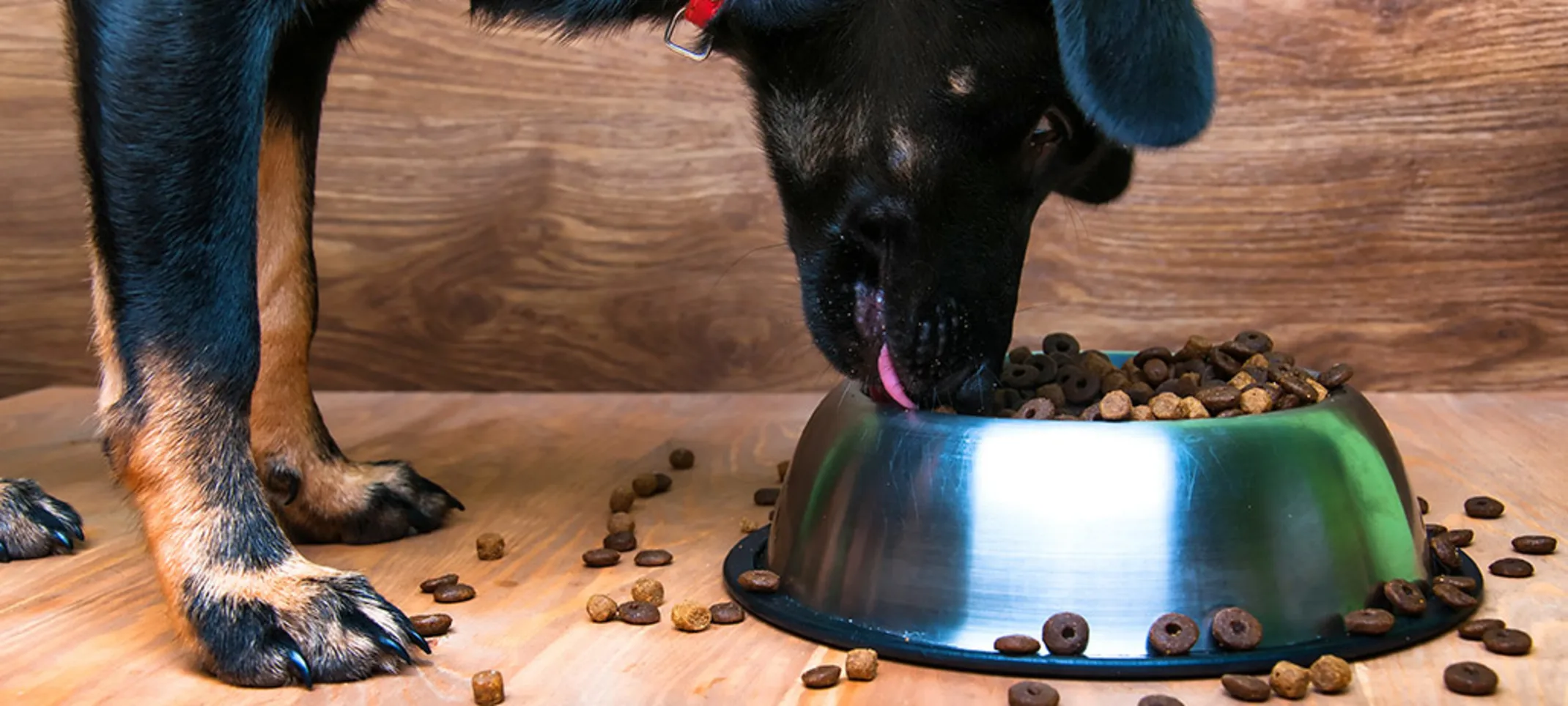Las Posas Veterinary Medical Center
Diet and Nutrition
Proper diet and nutrition can help your pet fight against disease, maintain a proper weight, and promote the overall well-being of your pet.

If your adult dog or cat is healthy, you may have chosen a pet food based simply on whether or not your pet will eat it. Cost may also play a factor in your decision. However, not all pet foods are equal. And feeding the right amount is not as simple as following the directions on the package (they’re just guidelines).
Choosing an appropriate diet can set your pet on a path of lifelong good nutrition and help prevent many problems, including allergies, nutritional deficiencies, skin and coat disorders, and obesity. Nutritional requirements for dogs and cats vary depending on a variety of factors, including age, breed, and health. For instance, senior pets have significantly different requirements than puppies or kittens, and animals with diabetes, kidney disease, and other health conditions can benefit from special diets.
Our veterinarians can help you make informed decisions about your pet’s diet. We can counsel you on which foods are the best choices based on your pet’s needs, how much to feed, and even how to decode pet food labels. We can create a nutrition plan specifically for your pet, and we’re also happy to work with owners to help their overweight pets get down to a healthy weight. Contact us to set up a personalized nutrition consultation for you and your pet.
Some points to keep in mind when selecting food for your pet(s) are listed below. You want to know that your pet’s food:
Meets specific dietary requirements for your pet’s age and health status
Delivers the right balance of nutrients
Is backed by scientific research
Has quality controls in place, such as ingredient screening and product inspections
Has gone through AAFCO feeding trials (i.e., the food was actually fed to dogs or cats to ensure they are getting proper levels of nutrients)
Is formulated for a specific life stage (i.e., growth, adult or senior)
Nutritional needs of pets change throughout their lives therefore no single food is appropriate for all stages of a pet’s life. Just like people, every dog and cat has unique nutritional needs based on their age, environment, health status and activity level. Puppies and kittens have different needs compared to adult and senior pets. Nutrition for each life stage is briefly discussed below.
Puppies and kittens (up to 1 year of age)
Proper nutrition during the first year of life is particularly important because it will give them a healthy start and will make a difference later in their life. Puppies and kittens need high quality nutrition to provide the extra ‘building blocks’ for healthy growth and the development of strong teeth, bones and muscles. It is also important to avoid “overfeeding” your puppy or kitten as that may result in an overweight adult. Ideally you don’t necessarily want to be able to see their ribs, but should be able to feel them without having to search for them. When your puppy or kitten reaches 12 months of age, he or she should be transitioned to an adult food.
Large and giant breed puppies (defined as dogs that will be 55 pounds or more as an adult)
Not all puppy foods are good for all breeds. Because large and giant breed puppies grow very rapidly, they have unique dietary requirements and it is crucially important they are fed properly during their first year. Examples of some specific large breeds are Labradors, Golden Retrievers, German Shepherds, Rottweilers, Weimaraners and Doberman Pinschers. Examples of giant breeds include Great Danes, Irish Wolfhounds, Giant Schnauzers and Saint Bernards. Obviously there are many mixed-breed dogs that fall into this category as well.
Studies show that large breed puppies require lower levels of dietary calcium and fat than small or medium-sized breeds. Consuming too much calcium and too many calories can increase the risk of developmental skeletal problems such as hip dysplasia and osteochondritis. Very few commercial puppy foods offer the ideal mix of calcium and calorie levels that these breeds need. We can provide you with feeding recommendations that will help you maximize your dog’s growth potential without causing developmental problems. We recommend that you do NOT give supplemental calcium to large breed puppies (this can include calcium pills as well as dairy products such as cottage cheese, milk, ice cream and cheese). For your convenience, we stock veterinary-approved diets for large and giant breeds.
Adult Pets
During adulthood, we want to feed a pet food that is designed specifically for the adult life stage. Since adult pets are no longer growing, they require less calories, calcium, protein, sodium and various other nutrients compared to a growth diet. We want to select a pet food that has optimal levels (not too much or too little) of nutrients to help maintain good health. It is also important to avoid overfeeding or select a pet food that has too many calories.
Senior pets
Dogs and cats are often considered older when they reach half of their life expectancy. A food change should be considered around the age of seven for cats and small to medium-sized dogs, and at five years for large and giant breed dogs.
Similar to humans, a pet’s body and daily activity levels change with age. Once your cat or dog enters their senior years, you can help maintain good health by altering the way you care for your pet. This includes the nutrition we select for them. Just as with adult pets, we want to select a pet food that has optimal levels (not too much or too little) of nutrients to help maintain good health. As pets mature, they may gradually begin to gain weight and develop age-related physical and behavioral changes. Older cats and dogs also have a greater risk of developing problems with their kidneys and heart. They may have special digestive needs, so a food with lower fat, protein, sodium, phosphorus and calorie levels with increased amounts of fiber is ideal.
Therapeutic pet foods
There are many therapeutic nutrition products available to help manage many of the diseases we see in pets. In many cases, nutrition is a critical part of the treatment regimen. Disease conditions that can be managed in part through nutrition include:
obesity and weight management
kidney disease
heart disease
liver disease
diabetes
arthritis
dental disease
cancer
intestinal conditions
dermatologic (skin) conditions
food allergy
urinary tract disease (including urinary bladder stones)
cognitive dysfunction in dogs
hyperthyroidism in cats
Please don’t hesitate to ask if a therapeutic pet food might be appropriate for your pet!
Our veterinarians can help you make informed decisions about your pet’s diet. We can counsel you on which foods are the best choices based on your pet’s needs, how much to feed, and even how to understand pet food labels. We can create a nutrition plan specifically for your pet, and we’re also happy to work with you to help an overweight pet get down to a healthy weight. Please call us to set up a personalized nutrition consultation for you and your pet. We’re happy to help!
